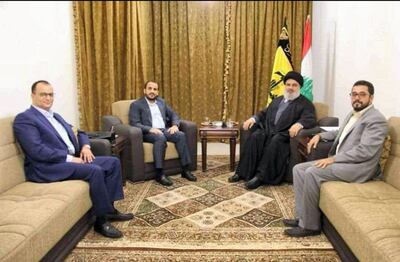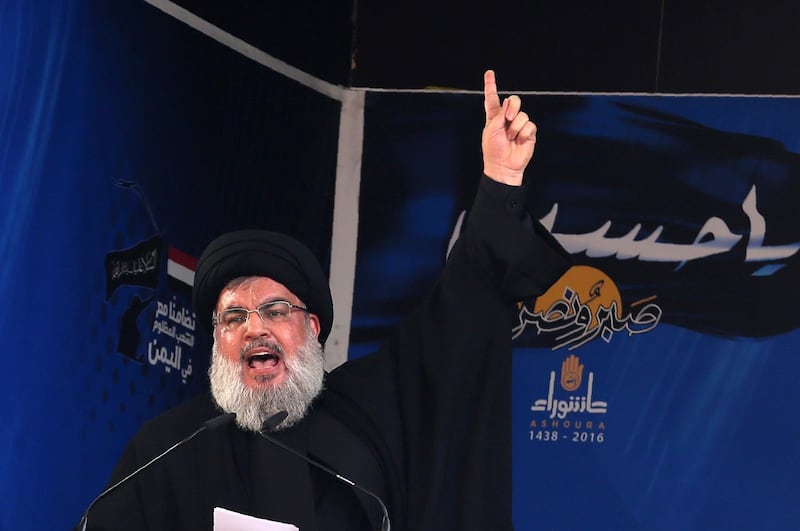Hassan Nasrallah, the elusive leader of Lebanese Shiite militant group Hezbollah, has recently voiced his support for the Iranian-backed Houthi insurgency in Yemen.
While his statements have angered Gulf countries and embarrassed Lebanon’s Saudi-allied leadership, they have proven popular with his base.
His June 29 speech paid a particularly vibrant homage to the Houthis. “I, and all my brothers and the resistance in the world ... should bow in tribute to those fighters” he said, before adding: “I am ashamed to not be among you.”
The Yemeni government, which is backed by the Arab Coalition, responded indignantly. Yemeni Foreign Minister Khaled Al Yamani wrote to his Lebanese counterpart Gebran Bassil complaining that Nasrallah was “blatantly interfering in internal [Yemeni] affairs”.
In mid-August, two months after the Arab Coalition began a major offensive to retake the Yemeni port of Hodeidah, Hezbollah pushed the display of solidarity even further during its annual commemorations of the 2006 war it fought against Israel.
Near the stage set up for the rebroadcast of Nasrallah's speech in Beirut was a reconstruction of a bus hit by a Coalition airstrike which had killed a number of civilians and children in Saada province several days earlier that the Arab-led force later said had been a mistake. The bus had been arranged for journalists to photograph, complete with actors impersonating the victims, special effects smoke, red lighting and fake blood in an evocative image of the war.

Just days later, a meeting between a Houthi delegation and Nasrallah was made public for the first time. Meetings had been organised before but had been “under the table,” according to Farea Al Muslimi, an associate fellow at UK-based international affairs think tank Chatham House.
Houthi spokesperson Muhamad Abdelsalam headed the delegation, which included Abdel Malek El Ejri, a member of the Houthi’s political bureau, and Ibrahim Al Dailami, director of the group’s TV network, Al Masirah.
The main purpose of the visit, Mr Al Ejri said, was to thank Nasrallah for his support for the Yemeni people.
In March 2015, Saudi Arabia entered the Yemeni war along with several Arab states to prevent Iran from gaining influence via the Houthis, who had made strategic advances in the country through the capture of the capital, Sanaa, and other Yemeni population centres.
Lebanese political analyst Lokman Slim, a prominent anti-Hezbollah voice, said “the visit itself was just a photo session”. Its true purpose was to make it clear to the Saudis that Lebanon has become a “rear base for Iranians and the Houthis”.
His analysis was shared by the UAE‘s minister of State for Foreign Affairs, Anwar Gargash, who tweeted: “Lebanon cannot be a logistical or political base for the Houthis. Ignoring [this] will only exacerbate its repercussions”.
Lebanese officials did not react to the Houthis’ visit despite Prime Minister Saad Hariri’s public disapproval of Hezbollah’s political activities outside Lebanon, particularly in Syria, where its powerful militia has fought alongside Bashar Al Assad’s forces for the past six years.
The relationship between Hezbollah and the Houthis – both being anti-Israeli and anti-American Shiite groups – is mutually beneficial, analysts say.
“For Hezbollah’s constituency, the war in Yemen is straightforward: it’s a continuation of the historic struggle between Sunni and Shiite,” says Hanin Ghaddar, a Friedmann visiting fellow at the Washington Institute.
_______________
Read more:
Saudi Arabia intercepts Houthi missile fired at Jazan
Houthis bar civilians from Hodeidah hospitals to keep beds for fighters
[ Arab Coalition airstrikes resume on Hodeidah after peace talk failure ]
_______________
“Additionally, talking about Yemen is a way of moving the debate away from Syria, a war with which people are losing patience.”
Hezbollah, which acts as a “middleman” on behalf of Iran in providing capacity building for the Houthis, is a “safe bet” for the rebels backed by Tehran, says Mr Al Muslimi.
“The Houthis dream is to emulate Hezbollah and be part of the [Yemeni] state while maintaining a militia. Abdel Malik Al Houthi [the movement’s leader] even uses his finger like Nasrallah during his speeches”. Yet, while Hezbollah serves as a regional power, the Houthis ambitions are limited to Yemeni borders.
The nature of their relationship has been hotly debated. Mrs Ghaddar says she has personally interviewed Hezbollah fighters who told her they had been to Yemen. Last June, the Arab Coalition reported to have killed eight Hezbollah members.
The Shiite militia denies this. “The relationship between Ansar Allah (the Houthi movement’s official name) and Hezbollah is purely political,” said Samir Hassan, a Lebanese analyst close to Hezbollah.
“The visit was an opportunity for the Houthis to present their case to a political party which has sympathy for their cause”.
Hezbollah’s displays of solidarity with the Houthis is also an attempt by Iran to not be sidelined should a deal with the Saudis come through, according to Mr Al Muslimi. “Iran is worried that any deal between the Houthis and the Saudis would be done at their expense."
As recently as last year, Houthi spokesperson Muhamad Abdelsalam told a Saudi newspaper that his group was ready to negotiate with the Kingdom. A “path of peace” was possible, he said, adding that “Saudi reassurances and understanding” had convinced them to participate in peace talks in Kuwait, which fell through a few months later.
“There have been [recent] attempts” at a Saudi-Houthi agreement, "Mr Ejri acknowledges. “But they are not clear yet”. The Saudi embassy in Beirut did not respond to a request for comment.
Following the collapse of UN-sponsored peace talks in Geneva last week, fighting around Hodeidah, which the Houthis have controlled since 2014, intensified. Over 70 rebel fighters were killed as the Houthis retreated from advancing Yemeni troops.
As the war drags on, the Houthis main ally, Iran, might be forced to reconsider its overseas interventions due to additional US sanctions scheduled for later this year.
But, as Mrs Ghaddar points out, if those new restrictions push the moderates from office in Tehran, the Islamic Revolutionary Guard Corps will consolidate its power and the Houthis may have more Iranian money at their disposal than ever before.






